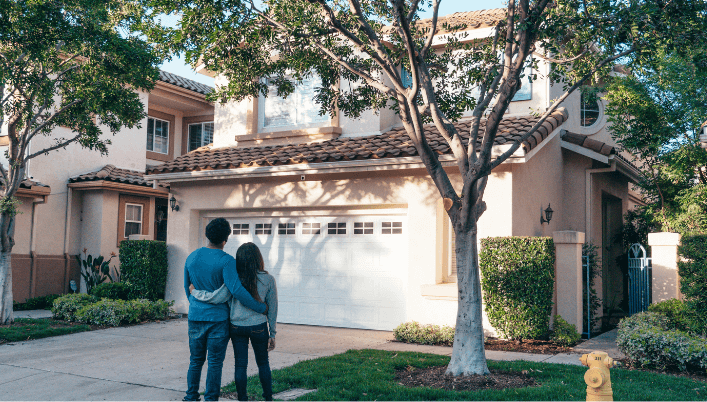
Investing in a landed property is a significant milestone for many individuals and families.
It provides a sense of stability and ownership that is unmatched by other types of housing.
However, buying a landed property comes with its own set of challenges and considerations.
In this article, we will explore the eligibility criteria for purchasing landed houses, financing options, exploring different districts for investment, pros and cons of living in a landed property, and navigating the legal aspects involved.
Key Takeaways
- Landed Properties Definition: Landed properties are houses with their own piece of land, offering privacy and space compared to shared properties like condominiums or HDB flats.
- Popularity in Singapore: Landed properties are rare and hold economic significance due to limited land supply. They are sought after for exclusivity and status.
- Privacy and Customization: Landed properties provide higher privacy and freedom to renovate without management approval, unlike condos or HDBs.
- Types of Landed Properties: Singapore offers terrace houses, semi-detached houses, bungalows, and GCBs, each catering to different preferences and budgets.
- Terrace Houses: Connected row houses with common walls, offering affordability and ownership of landed property.
- Bungalows: Standalone luxury houses with gardens, symbolizing prestige and wealth, with strong historical appreciation.
- Investment Benefits: Landed properties offer long-term capital appreciation due to scarcity and contribute to wealth preservation and growth.
- Rental Returns: Prime location landed properties attract higher rental yields, appealing to expatriates and high-income individuals.
- Market Trends: Economic factors and regulations influence landed property market trends. Stay informed to make informed investment decisions.
- Property Value Influences: Economic growth, employment rates, and interest rates impact property values, affecting prices during economic cycles.
- Choosing a District: Consider location, amenities, and future development plans when investing in landed properties.
- Living in Landed Properties: Offers privacy, space, and value appreciation but may be expensive and require maintenance.
- Legal Aspects: Understand land titles, stamp duty, and URA guidelines for smooth ownership and development.
- GCBs and Detached Houses: Good Class Bungalows offer exclusivity, while detached houses provide customization options.
- Buying Process: Eligibility criteria for citizens and PRs, property types, and steps in the buying process.
- Evaluating Prices: Consider factors like location, size, condition, and market trends when evaluating property prices.
- Negotiating the Deal: Research, gather information, and work with experienced agents to negotiate the best deal.
- Financial Planning: Assess budget, borrowing capacity, and additional costs like stamp duty and legal fees when planning to buy.
- Smooth Purchase Process: Work with experienced agents, plan financially, and be prepared to make confident decisions.
- Proper Planning: Thorough research, property visits, understanding the market, and setting priorities to ensure a successful transaction.
Introduction to Landed Properties
What are landed properties?
Landed properties refer to houses that come with a piece of land, as opposed to properties like condominiums or HDB flats, which are built on a shared piece of land.
Landed properties offer more privacy and space compared to other types of residential properties.
Why are landed properties popular in Singapore?
Landed properties are popular in Singapore due to their rarity and exceptional economic contribution to the country.
The limited supply of land in Singapore makes landed properties highly sought after, contributing to their exclusivity and status symbol.
How do landed properties differ from other types of properties?
Compared to condominiums and HDB flats, landed properties offer a higher level of privacy and personalization.
Homeowners have the freedom to renovate and modify their properties according to their preferences, without the need for approval from management committees.
Understanding the Different Types of Landed Properties in Singapore
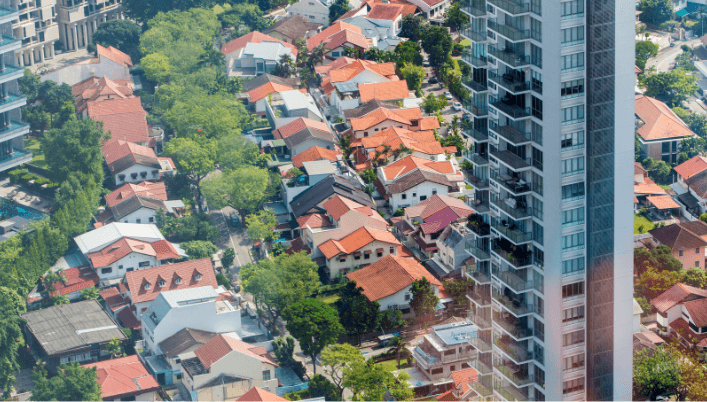
What are the different types of landed properties available in Singapore?
Singapore offers various types of landed properties, including terrace houses, semi-detached houses, bungalows, and good class bungalows (GCBs).
Each property type has its unique features and price points, catering to different preferences and budgets.
What are the key features of terrace houses?
Terrace houses are typically two or three-story houses that are connected to one another in a row.
These houses share common walls and usually have a small outdoor area at the front and back.
They are an affordable option for those looking to own a landed property.
What are the key features of bungalows?
Bungalows, on the other hand, are standalone houses that offer the ultimate luxury and privacy.
They are typically spacious and feature a garden or outdoor area.
Bungalows are the most expensive type of landed property in Singapore and are often associated with wealth and prestige.
Benefits of Investing in Landed Houses
Why should you invest in a landed house?
Investing in a landed house can be a smart financial move.
Landed properties have a track record of long-term capital appreciation, making them a solid investment for wealth preservation and growth.
Additionally, the land under the property provides scarcity value, ensuring that its value will remain strong even in times of market fluctuations.
What are the potential rental returns for landed properties?
Landed properties in prime locations have the potential to command higher rental yields compared to non-landed properties.
As these properties offer more space and privacy, they are particularly attractive to expatriates and high-income individuals who are willing to pay a premium for premium living.
What are the long-term capital appreciation prospects for landed houses?
Historically, landed properties in Singapore have shown strong capital appreciation over the years.
Limited land supply and the continuous influx of foreign investors have contributed to the steady rise in property prices.
As demand for landed housing remains strong, it is highly probable that their value will continue to appreciate in the long run.
Exploring Property Market Trends for Landed Properties

What are the current property market trends for landed properties?
The performance of the landed property market in Singapore is closely tied to economic factors and government regulations.
It is important to stay informed about market trends, including changes in property prices, transaction volumes, and rental rates.
Analyzing market trends can help potential buyers make informed decisions and identify opportunities for investment.
How do economic factors impact the value of landed properties?
Economic factors such as GDP growth, employment rates, and interest rates can influence the value of landed properties.
During periods of economic growth, property prices tend to rise, benefiting property owners.
Conversely, during economic downturns, property prices may experience fluctuations or even decline temporarily.
What are some considerations when analyzing property market trends for landed houses?
When analyzing property market trends for landed houses, factors such as location, property condition, neighboring developments, and government policies should be taken into account.
It is essential to conduct thorough research and consult with property experts to gain a comprehensive understanding of the market and make informed investment decisions.
Factors to Consider When Buying Landed Property
What is the land title and why is it important?
The land title refers to the legal document that proves ownership of the land.
It is important to ensure that the land title is clean and free from any encumbrances or disputes.
Engaging the services of a property lawyer can help facilitate the process of verifying the land title and ensuring a smooth transaction.
How does stamp duty apply to the purchase of a landed property?
Stamp duty is a tax levied on the purchase of properties in Singapore.
The rates vary depending on the purchase price of the property and the buyer’s residency status.
Buyers should be aware of the stamp duty payable and factor it into their budget when buying a landed property.
What are the financing options for buying a landed property?
There are various financing options available for buying a landed property, including bank loans and the use of CPF funds.
Buyers should explore different financing options and consider their financial capabilities before committing to a purchase.
It is advisable to seek professional advice from mortgage advisors or bankers to determine the most suitable financing option.
Eligibility Criteria for Purchasing Landed Houses
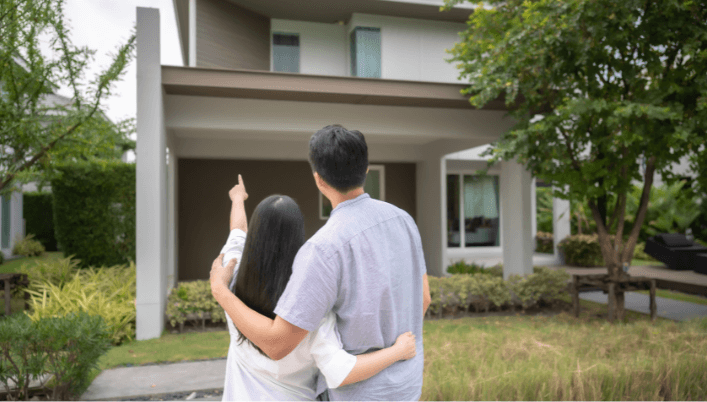
Minimum Plot Size Requirements for Landed Properties
One of the key considerations when purchasing a landed property is the minimum plot size requirement.
Different districts may have different specifications, and it’s important to be aware of these requirements before making a purchase.
For example, some districts may require a minimum land area of 400 sqm for a property to be considered as landed.
Assessing Your Financial Eligibility for Landed Property Purchase
Assessing your financial eligibility is crucial when considering a landed property purchase.
Financial institutions will evaluate various factors such as your monthly income, employment income assessable for tax, and any existing debts you may have.
It’s essential to have a stable and sufficient income to support the cost of purchasing and maintaining a landed property.
Navigating the Debt Servicing Ratio for Landed Property
Debt servicing ratio is another important aspect to consider.
This ratio determines the proportion of your monthly income that can be used to service your debts, including the mortgage for the landed property.
Financial institutions typically have prescribed ratios in place, and exceeding these ratios may affect your ability to secure a loan for the purchase.
Financing Options: Using CPF and Housing Loans for Landed Property Purchase
Utilizing Your CPF for Landed Property Purchase
CPF, or Central Provident Fund, can be utilized to partially finance your landed property purchase.
Singaporeans and Permanent Residents may use their CPF savings to make a down payment and service their mortgage.
However, there are specific rules and limitations imposed by CPF Board, and it’s important to seek advice from a qualified professional to ensure compliance.
Exploring Housing Loan Options for Landed Property
When it comes to financing a landed property, housing loans offer a convenient option.
Several financial institutions provide housing loan packages specifically tailored for landed properties.
It’s crucial to explore and compare different loan options to find the best fit for your financial situation and goals.
Understanding Financial Institution Requirements for Landed Property Loans
Each financial institution may have different requirements and criteria for offering loans for landed properties.
These requirements may include a minimum floor area, minimum land size, and other factors related to the property.
Understanding these requirements and ensuring compliance will increase your chances of securing a loan.
Exploring Different Districts for Landed Property Investment

Popular Landed Property Districts in Singapore
Singapore offers a wide range of districts that are popular for landed property investments.
Some of these popular districts include Sentosa Cove, Districts 9, 10, and 11, and other prime locations.
Each district has its own unique features and appeal, and it’s essential to consider factors such as proximity to amenities, transportation options, and growth potential.
Factors to Consider When Choosing a District for Landed Property Investment
Choosing the right district for your landed property investment requires careful consideration of various factors.
These factors include the accessibility and convenience of the location, the presence of good schools and healthcare facilities, and the overall development plans for the area.
It’s important to research and analyze these factors to make an informed decision.
Assessing Growth Potential and Resale Value of Landed Properties in Different Districts
Assessing the growth potential and resale value of landed properties is crucial for long-term investment.
Factors such as infrastructure development, upcoming projects, and overall market demand play a significant role in determining the future value of the property.
Working with a reputable property agent can provide valuable insights into the market trends and potential growth areas.
Pros and Cons of Living in a Landed Property
Advantages of Living in a Landed Property
Living in a landed property offers numerous advantages.
First and foremost, there is a sense of privacy and exclusivity that comes with owning a plot of land.
Landed properties also provide ample space, both indoors and outdoors, allowing for more flexibility in terms of interior design and landscaping options.
Additionally, owning a landed property can act as a store of value and potentially appreciate over time.
Disadvantages of Living in a Landed Property
Despite the advantages, there are also some disadvantages to consider.
Landed properties tend to be more expensive compared to non-landed homes such as condominiums.
Maintenance and upkeep can also be time-consuming and costly, especially for larger properties.
Additionally, some landed properties may be more susceptible to natural disasters or soil condition issues, requiring additional precautions and maintenance.
Factors to Consider Before Deciding to Live in a Landed Property
Before making the decision to live in a landed property, it’s important to consider various factors.
These factors include your lifestyle preferences, financial capabilities, and long-term goals.
Assessing your ability to handle the costs and responsibilities of living in a landed property is crucial to ensuring a smooth and enjoyable living experience.
Navigating the Legal Aspects: Land Titles, Stamp Duty, and URA Guidelines
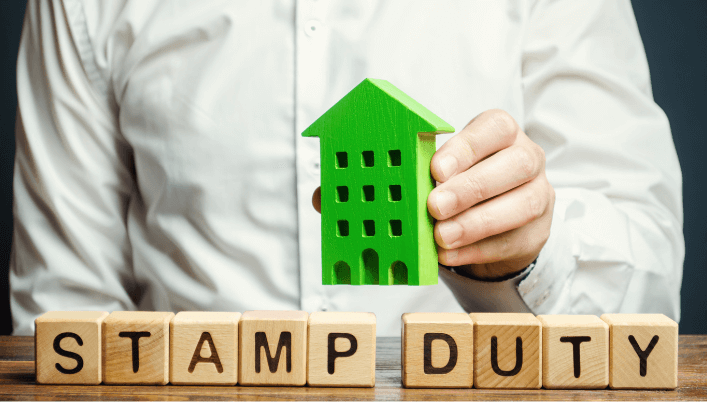
Understanding Different Types of Land Titles for Landed Properties
Landed properties in Singapore may have different types of land titles, including strata title and individual title.
It’s important to understand the distinction between these titles and the associated rights and responsibilities.
Understanding the specific land title can help you make informed decisions and avoid potential complications in the future.
Calculating Stamp Duty for Landed Property Purchase
Stamp duty is a tax imposed on the purchase of any property in Singapore, including landed properties.
The amount of stamp duty payable is based on the purchase price or market value of the property, whichever is higher.
It’s important to calculate and budget for the stamp duty when planning to buy a landed property.
Complying with URA Guidelines for Landed Property Ownership and Development
The Urban Redevelopment Authority (URA) in Singapore has specific guidelines for owning and developing landed properties.
These guidelines govern aspects such as the size and type of development, site coverage, and permissible uses.
It’s crucial to seek approval and adhere to these guidelines to avoid potential legal consequences.
Investment Potential: Rental Returns and Long-Term Growth of Landed Properties
Understanding the investment potential of landed properties
Investing in landed properties can offer great potential for both rental returns and long-term growth.
Landed properties, unlike non-landed properties such as condominium developments, provide homeowners with exclusivity, privacy, and a sense of ownership as they come with their own land.
Exploring the rental returns of landed properties
Landed properties tend to attract higher rental incomes compared to non-landed properties.
This is primarily due to the larger space and the appeal of having a house with its own land.
Additionally, landed properties are often in high demand among expatriates, adding to their rental potential.
Analyzing the long-term growth of landed properties
Landed properties in Singapore have shown exceptional economic contribution and continued growth over the years.
The scarcity of land and the limited supply of landed properties contribute to their long-term appreciation.
Owning a landed property can be a wise investment choice for those looking to grow their wealth over time.
Exclusive Properties: Good Class Bungalows (GCBs) and Detached Houses
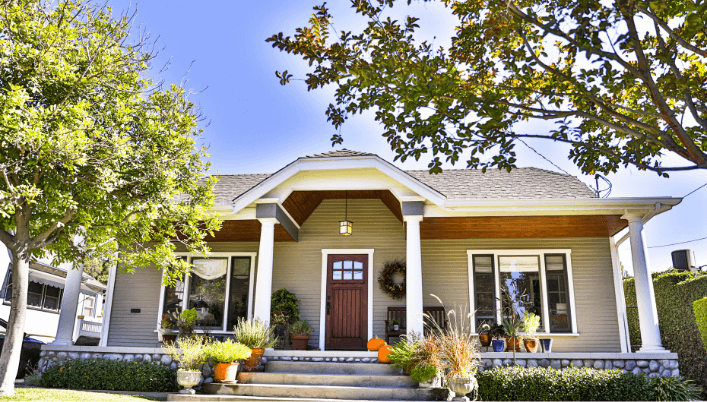
What are Good Class Bungalows (GCBs) and their benefits?
Good Class Bungalows, also known as GCBs, are among the most exclusive and sought-after properties in Singapore.
These properties are limited in supply and are only available to Singapore citizens.
GCBs offer spacious living areas, luxurious amenities, and great privacy, making them a top choice for wealthy individuals and families.
Exploring the features and advantages of detached houses
Detached houses, also known as landed houses, are another popular option for property buyers in Singapore.
These houses are standalone properties that offer homeowners the freedom to customize and design their living spaces according to their preferences.
Detached houses provide ample space, privacy, and flexibility for families looking for their dream home.
Things to consider when buying exclusive properties
When buying exclusive properties like GCBs or detached houses, it is crucial to consider factors such as location, amenities, accessibility to schools and amenities, and future development plans in the surrounding areas.
Engaging an experienced property agent who specializes in exclusive properties can help you navigate through the buying process and make informed decisions.
Step-by-Step Guide to Buying Landed Property in Singapore
Understanding the eligibility criteria for buying landed property
Before buying landed property in Singapore, it is important to understand the eligibility criteria.
Currently, only Singapore citizens and Singapore Permanent Residents (SPRs) are eligible to purchase landed properties.
SPRs must have held the status for at least five years before they can buy a restricted property type.
Exploring the different types of landed properties available
In Singapore, there are various types of landed properties available, ranging from terrace houses, cluster houses, corner terrace houses, and more.
Each property type has its unique features and advantages.
It is essential to evaluate your needs, preferences, and budget to determine the most suitable property type for you and your family.
Steps involved in the buying process of landed property
The process of buying landed property in Singapore involves several steps.
These include conducting property searches, engaging a property agent, arranging property viewings, obtaining financing, paying an option fee, exercising the option to purchase, and completing the necessary paperwork to transfer ownership.
Working with professionals throughout the process can ensure a smooth and successful purchase.
Evaluating Property Prices and Negotiating the Best Deal

Factors to consider when evaluating the prices of landed properties
When evaluating the prices of landed properties, there are several factors to consider.
These include location, size, condition, land tenure, and recent market trends.
It is crucial to research and compare similar properties in the area to determine a fair market value.
Engaging a property agent with a deep understanding of the local market can provide invaluable insights.
Understanding the negotiation process for buying landed property
Negotiating the purchase price of a landed property requires careful consideration and preparation.
It is essential to conduct thorough due diligence, gather relevant information, and present a compelling offer based on market conditions.
Negotiations can be complex, and having an experienced property agent by your side can increase the chances of securing the best deal.
Tips for negotiating the best deal for landed property
When negotiating the best deal for a landed property, it is important to approach the process strategically.
Some tips to consider include researching the seller’s motivation, understanding the current market conditions, setting a budget, being patient, and seeking professional advice.
A skilled property agent can guide you through the negotiation process and help you achieve your desired outcome.
Expert Tips for a Smooth Landed Property Purchase Process
Importance of working with an experienced property agent
Working with an experienced property agent is crucial when buying a landed property in Singapore.
An experienced agent possesses in-depth knowledge of the market, can provide guidance throughout the process, and has access to a wide network of sellers and properties.
They can help you identify suitable properties, navigate complex paperwork, and negotiate favorable terms.
Financial planning considerations for buying landed property
Buying landed property requires careful financial planning.
It is important to assess your budget, evaluate your borrowing capacity, consider additional costs such as stamp duty, property tax, and legal fees, and have a contingency fund for unexpected expenses.
Seeking professional advice from financial planners or mortgage specialists can ensure that you make informed financial decisions.
Proper planning for buying landed property
Proper planning is essential when buying landed property in Singapore.
This includes conducting thorough research, visiting multiple properties, understanding the local property market, establishing your priorities and requirements, and setting a realistic timeline for your purchase.
Being well-prepared can help you make confident decisions and increase the chances of a successful transaction.
Conclusion
Discover the World of Landed Properties: Your Ultimate Guide
Are you ready to unlock the world of luxurious living and smart investment opportunities? Landed properties, those exclusive homes with a piece of land to call your own, offer privacy, space, and a prestigious lifestyle that’s truly unmatched.
If you’re curious about what makes these properties so sought after, look no further – we’ve got the comprehensive guide you’ve been waiting for.
Why Landed Properties Reign Supreme
Dive into our exploration of the allure behind these homes.
Learn why landed properties are the talk of the town in Singapore and their exceptional contribution to the nation’s economy.
In a city where space is precious, owning a piece of land is not just a status symbol; it’s a savvy investment.
Types of Landed Properties: From Terrace Houses to GCBs
Unravel the array of options available to you, from the charming terrace houses to the elite Good Class Bungalows (GCBs).
Discover the features that set each type apart and find the one that resonates with your lifestyle and aspirations.
Investment Potential: High Returns and Long-Term Growth
Ready to make your money work for you? Learn how investing in landed properties can be a game-changer.
With higher rental returns, potential for long-term growth, and their scarcity driving up demand, these properties are more than just homes – they’re your golden ticket to a secure financial future.
Buying Your Dream Landed Property: A Step-by-Step Guide
Follow our expertly crafted roadmap to secure your dream property.
From eligibility criteria to navigating URA guidelines, we’ve got your back.
Understand the legal aspects, calculate stamp duty, and explore financing options.
With this guide, you’re in control.
Exclusive Insights: Expert Tips and Negotiation Know-How
Our seasoned experts spill the beans on how to negotiate the best deal.
Discover the importance of working with an experienced property agent, financial planning tips, and everything else you need to ensure a smooth, satisfying purchase process.
Are you ready to embark on a journey that promises both a lavish lifestyle and smart financial moves? Stay tuned for the ultimate guide to landed properties in Singapore – your gateway to a world of luxury and investment opportunities!
Frequently Asked Questions
What is a landed property?
A landed property refers to a type of residential property in Singapore that includes houses such as bungalows, detached houses, semi-detached houses, and terrace houses.
These properties typically have their own land and are not part of a larger condominium development.
Can foreigners buy landed property in Singapore?
Foreigners are generally not allowed to buy landed property in Singapore.
However, there are exceptions for certain types of landed properties known as Good Class Bungalows (GCBs).
Foreigners who have made an exceptional economic contribution to Singapore may be considered eligible to purchase a GCB.
What is the difference between landed property and a condo?
Landed property refers to houses that have their own land, while a condo is a type of private residential property that is part of a larger development.
Condos are typically high-rise buildings with shared facilities and amenities, while landed property offers more space and privacy.
Can Singapore citizens buy landed property?
Singapore citizens are generally eligible to buy landed property in Singapore, subject to certain conditions set by the government.
Singapore citizens must be at least 21 years old and must not own any other residential property both locally and overseas, unless they have disposed of it within 6 months of purchasing the landed property.
How can I afford a landed property in Singapore?
Affording a landed property in Singapore may require substantial financial resources.
It is important to have a stable income and a good credit history.
You may also need to consider mortgage financing options and engage the services of a property agent who can provide advice on the current market conditions and potential financing options.
What are the pros and cons of buying a landed property?
The main advantages of buying a landed property are the privacy, space, and potential for capital appreciation.
Landed property also offers greater customization options compared to condominiums.
However, the higher cost, maintenance responsibilities, and limited supply of land are some of the disadvantages to consider.
How is the landed property market in Singapore?
The landed property market in Singapore is generally considered to be stable and resilient.
Landed properties are in high demand due to their limited supply and the prestige associated with owning a landed property.
However, market conditions can vary depending on factors such as location, property size, and economic factors.
How can I stay in a landed property?
To stay in a landed property in Singapore, you can either purchase a landed property or rent one from a landlord.
If you are considering purchasing a landed property, you will need to meet the eligibility criteria set by the government, including being a Singapore citizen or permanent resident and fulfilling certain financial requirements.
Can I use my CPF to buy a landed property?
Yes, you can use your CPF (Central Provident Fund) savings to buy a landed property in Singapore.
However, there are specific rules and limitations on how much CPF can be used for the purchase.
It is advisable to consult with CPF Board or a financial advisor to understand the exact details and requirements.
What are the steps involved in buying a landed property in Singapore?
The steps involved in buying a landed property in Singapore include determining your budget and eligibility criteria, engaging a property agent to help with the search, viewing potential properties, conducting due diligence on the property, negotiating the purchase price, engaging a lawyer to handle the legal documentation, and completing the transaction by paying the purchase price and stamp duties.












